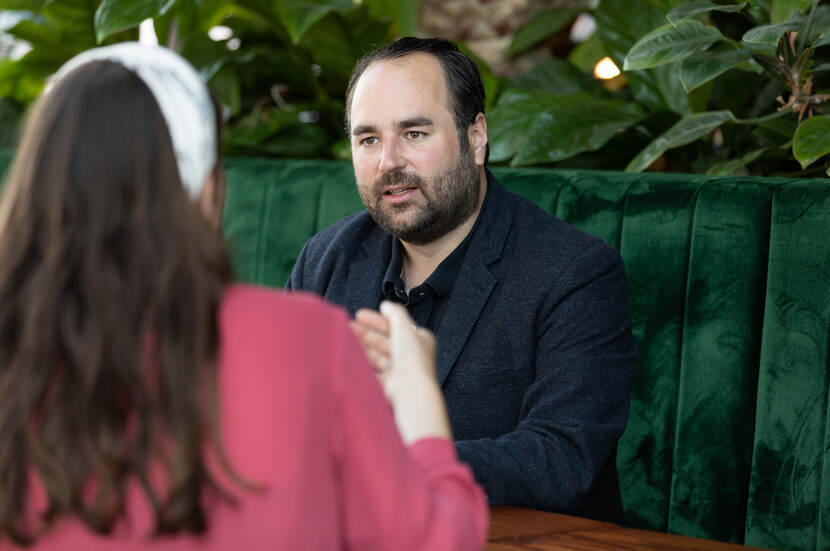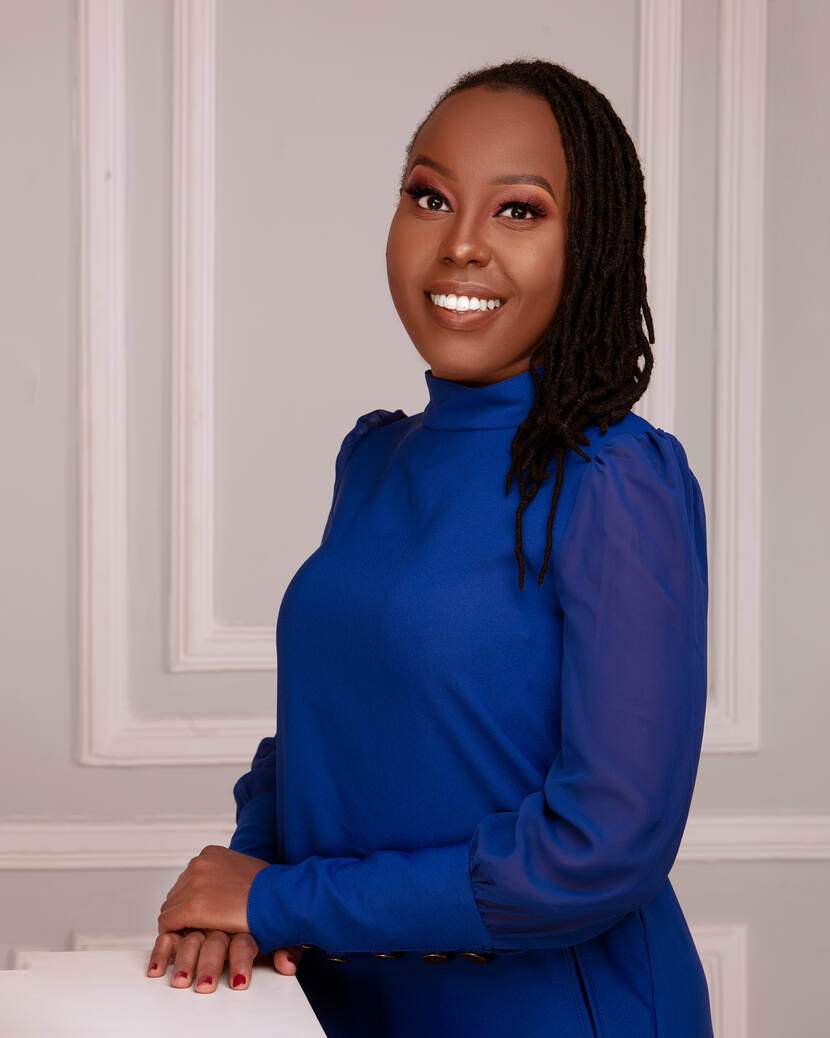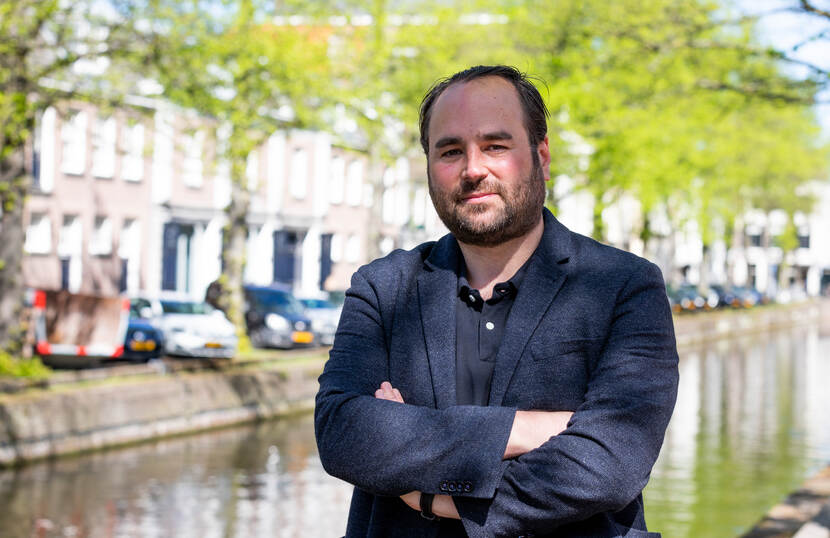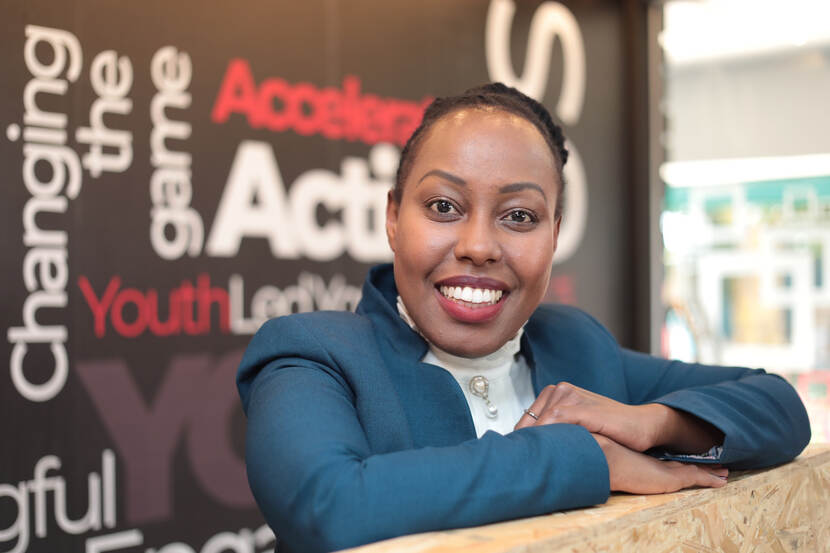Being heard: the voice of a generation is getting through
Now, more than ever, young Africans deserve a place at the policymaking table, say Amref’s youth expert Evalin Karijo and diplomat Tijmen Rooseboom in a joint plea. They discuss ‘tokenism’, contraception and what real youth participation involves. But they have hope. ‘I’m actually very heartened by what I see.’

While European governments worry about the sustainability of the welfare state as their populations age, African leaders have entirely different concerns. Africa is not only the world’s youngest continent, it is also the only one where the number of young people is set to grow over the coming decades. According to the Brookings Institution, by 2050 an estimated billion or so Africans will be under the age of 24.
This brings opportunities – a young population gives a bigger ‘demographic dividend’ – but also challenges, from high youth unemployment to a growing number of teenage pregnancies. Furthermore, many African countries are gerontocracies, where political decisions are made mainly by older leaders.
This fact is beginning to get through to established development organisations and Western governments, two experts tell us on a Zoom call. Evalin Karijo (34) is the Kenyan director of the Youth and Adolescent Hub of Amref Flying Doctors, the biggest health organisation working in Africa. Tijmen Rooseboom (39) is a diplomat, and the Dutch Ambassador for Youth, Education and Work.
Youth participation is not just an option, but a necessity
In view of demographic developments, more youth participation is not just an option, according to Karijo, it is a necessity. ‘We’re at a tipping point’, she says.

Until recently Karijo was head of Youth in Action, an Amref initiative launched in 2017 to help young people get into policymaking. Since then, it has grown into an entire movement, with over 800 affiliated youth organisations in Kenya alone.
For some months now, Karijo has been coordinating Amref’s two-year Youth and Adolescent Strategy. ‘We had several youth initiatives, but there was too little connection between them. Apart from the youth programmes, we had few young people in positions of leadership. We plan to change this over the next two years.’
Rooseboom preaches the same brand of youth evangelism, but his is the world of diplomacy and development cooperation. He became ambassador in 2019. The Netherlands is the only country with a special ambassador who champions the interests of young people on the global stage.
Less than a year later the Ministry of Foreign Affairs unveiled its own youth strategy, Youth at Heart. The idea is that the focus of development cooperation must be shifted more to young people. The Dutch government is working with several partners, including companies and UN agencies, to invest in opportunities for young people in developing countries. One of the programmes is a fund that is helping 200,000 young people in Africa and the Middle East find work.
In November Rooseboom and the Ministry organised a virtual Youth at Heart forum, an online event on education and work. Young people from all over the world gathered in four recording studios to discuss these matters with each other, with representatives of international organisations and with the Minister for Foreign Trade and Development Cooperation.
‘Sometimes this means that older generations have to give up their seat’
The Youth at Heart principles were presented at the forum, in the form of a youth manifesto written by twelve young researchers from the focus regions. ‘In essence’, says Rooseboom, ‘it’s about ensuring that young people get a seat at the table everywhere. Sometimes this means that older generations have to give up their seat. That applies to me too; I’m not young any more either.’
He almost qualifies, however – certainly by African standards. African countries generally employ a broader definition of youth, Karijo explains. ‘In Africa you’re generally regarded as a young person until you turn 36.’ She herself just still qualifies, at 34.
Though Rooseboom is no longer officially a young person, he talks about his work with a youthful passion. His interest in youth participation was kindled before he became ambassador, when he lived and worked as a diplomat in a number of countries in Africa. ‘I soon learned that though you might work in a setting with lots of young people, it doesn’t necessarily mean that what you do will actually improve the lives of young people.’

He talked to young entrepreneurs from Somalia, for example. ‘They were very sceptical about the established institutions in their country, particularly the Chamber of Commerce. Shortly afterwards I talked to a big international organisation where I was told they were setting up a programme for youth employment in collaboration with – you guessed it – the Chamber of Commerce. So I asked, “Have you actually thought about what young people themselves think of the plan?” They fell silent.’
Karijo: ‘This illustrates a broader problem – a small group of people taking decisions for the majority. Three-quarters of the population are under 35, but you wouldn’t say so if you look at our political leaders. We’ve a long way to go before African politics actually reflects the population of Africa.’
Why is it that they tend to be so old?
Karijo: ‘There are historical reasons for it. In many countries society is not only patriarchal, but traditionally it has always been older people who take the decisions. Older generations often regard the growing number of young people as a threat. We have to move to another paradigm, where young people are seen as an asset, not as a threat.’
Young people may be a growing majority, but that fact alone will not necessarily give them more political influence. ‘Lots of young people never learn how to influence policy’, says Karijo, ‘or how to organise themselves politically. You may have lots of ambitions, but how do you set about achieving them?’
This is what she is trying to change. With her work for Amref, she teaches young people lobbying skills, and coordinates several campaigns. In Kenya, youth-led local action groups are drawing policymakers’ attention to the high number of teenage pregnancies. The youth movement Youth4UHC (Youth for Univeral Healthcare) is campaigning for all African countries to have a collective health system by 2030. ‘Our attempts to connect young people in different countries are really disruptive – in a good way.’
Are policymakers prepared to debate with empowered young people who do manage to find their way to the table?
Karijo laughs. ‘It’s not that bad actually, the atmosphere is not that hostile. Our talks with politicians are generally on pretty good terms. They often admit that they find it difficult to reach young people.’
Rooseboom: ‘That sounds familiar. African leaders generally also realise the opportunities and challenges associated with their young population. In that sense we’re not telling them anything they don’t know.’ He also tries to draw attention to young people’s interests outside Dutch youth programmes, too.
‘Last week the Dutch ambassador and I talked to some young people from Burkina Faso. They told us about the specific problems they encounter on the labour market. That same day we had a meeting with the minister for youth affairs, who’s also a special adviser to the president. We highlighted the young people’s concerns. It’s just a small example, but that’s how we use diplomacy to show what the Netherlands regards as important.’
Karijo and Rooseboom both say that youth participation is not just about non-committal meetings and one-off roundtable talks. There has to be real change. ‘Accountable’ is a word that comes up often. Karijo tells us about the Youth Power Hub, a digital platform set up by Youth in Action to enable young people from Africa to take part in the International Conference on Population and Development held in Nairobi in 2019.
‘Now we are looking to see if the promises are being kept. That’s not so common’
‘As young people, we had input into the agreements made at the conference’, she says. ‘Now we are looking to see if the promises are being kept. That’s not so common here.’
‘Countries made certain commitments at the conference’, she explains, ‘that more money would be made available to combat sexual violence, for example. We made a list of all the promises each country made and we’re keeping track of progress. We discuss this at follow-up sessions with policymakers, and we point out areas where work still needs to be done.’
Rooseboom: ‘The great thing about what Evalin does, I think, is that it’s not just “tokenism”: quickly getting young people into the conference at the last minute. Young people are properly involved at all stages.’
Karijo’s job mainly concerns youth participation in the health sector. There is relatively little about health in the Dutch Youth at Heart strategy, it’s mainly about work and education. Why is that?
‘Young people’, Rooseboom says, ‘are often in a transitional phase of their lives, moving from learning to earning. The strategy therefore focuses on education and work, but that’s not all. We also do a lot on climate, and sexual and reproductive health and rights (SRHR). We might be able to work together more on the latter in the future, Evalin, so keep in touch with the Dutch.’
He continues: ‘Every year millions of young people enter the labour market, but are unable to find a good job. Most of them have qualifications, but the skills they learn at school are often not what they need for the work that is available. One boy from Kenya put it really well. He’d worked really hard at school and was proud of his qualifications. But once he started working, he realised “The world is a desert, and I have a diving certificate”.’
This skills gap is an intractable problem in Africa. According to a 2017 World Bank Report, over the past few decades spending on education in Africa has increased sevenfold, but it has not improved the situation much so far.
Is it not also a matter of self-interest for the Netherlands? Something like: let’s invest in skills for young people, because that will provide opportunities for Dutch business?
Rooseboom: ‘I understand why you ask the question, but Youth at Heart is mainly intended to improve Dutch development cooperation – and if you regard that as something countries do largely in their own interests, then you could say yes.
‘All our programmes are based on the same question: what do young people themselves think they need? Although more economic development and more startups are also good news for the Netherlands, of course.’
Evalin, do you regard Western countries as allies in the battle for young people’s rights in Africa?
‘Hmm... We always have to remain critical of Western governments, but we do try to focus mainly on the positive aspects of their policies. I’m glad to see more focus on young people in Dutch foreign policy. What’s more, at the end of the day we need each other.
‘Just think about an issue like migration. One of the risks is that you get a “braindrain”. At the same time, lots of Western countries need younger workers because of demographic ageing. So young Africans going to Europe or the US to earn an income does not necessarily have to be a problem.
‘We too realise that the West needs Africa, and Africa needs the West’
‘As long as there are good policies that ensure countries can help each other out. We too realise that the West needs Africa, and Africa needs the West.’
Rooseboom has noticed that the importance of youth participation has already moved higher up the SRHR agenda. ‘If you look at the partners we work with in this area, I think they are much more aware of the fact that it’s good to involve young people. The Netherlands has a special Youth Ambassador for SRHR, and we work closely with Choice. Would you agree, Evalin? Is youth participation in the SRHR sector a good example of how things should be done?’
Karijo: ‘Yes, I agree entirely. And it’s no surprise, as matters related to SRHR, like contraception are of course particularly relevant to young people. SRHR is indeed ahead as a sector. In education, strangely enough, the importance of youth participation hasn’t really been taken on board, whereas you might particularly expect it to be there. I don’t know why that is.’
Isn’t it striking that on SRHR in particular – which is associated with quite a lot of cultural and religious sensitivity – young people are starting to play such a big role in decision-making?
Karijo: ‘Yes, but it’s because the old way didn’t work. You had situations where organisations would launch contraception campaigns, but they’d often been devised by older people, and they tend to be non-users. Many young people just didn’t respond to those campaigns. Policymakers started scratching their heads and wondering why it wasn’t working.
‘Lots of young people prefer to buy the morning-after pill at the checkout in a store’, she continues with a smile, ‘rather than going to a health centre where they might encounter their aunt or their parents. It’s little things like that. If you get young people involved, you’re more likely to find these things out. Policymakers realise that now.’

If it were up to Rooseboom the SRHR sector would soon no longer be an exception in this respect, and he has reason for hope. ‘There’s a movement afoot’, he says. ‘If you look at what Amref is doing, what the Netherlands is doing, at what I believe you at Vice Versa are doing too. All around me I see young people gaining a voice. I hope that the Netherlands can continue to drive this movement by drawing attention to the interests of young people in our contacts with the EU, major UN agencies and donors.
‘It’s also becoming more of a hot topic at our embassies, particularly over the past year. Some even have special youth circles. I’m actually very heartened by what I see. I hope of course that in the future this movement becomes unnecessary, and that young people have a place at the table everywhere in ten years’ time.’
Do you, Evalin, as a young African woman, have any advice for the Dutch government?
She thinks for a moment. ‘I would say, invest more in South-South partnership, in a way that is also relevant to young people in developing countries. Organise forums where young people in West and East Africa can exchange ideas, or meetings where African and Asian youngsters meet and launch projects together. That way, we’ll ensure all young people benefit.’
This article was previously published in 'Vice Versa - Jongerenspecial 2021'
Text: Elian Yahye